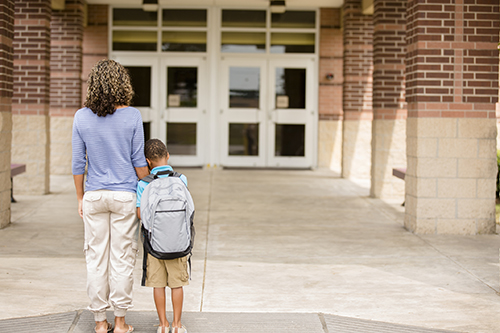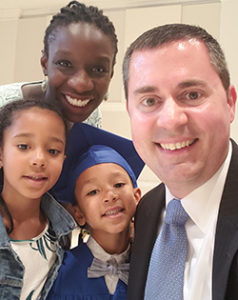A few weeks before school, my rising Kindergartner, David, bunny-hopped home from a playdate at our neighbor’s house with his pants at his ankles.
Rushing to meet him, I warned, “You are not going to be able to do that in Kindergarten!”
While as a rule, no one at any age should hop around the neighborhood with their pants around their ankles, all summer I’d found myself hanging and re-hanging the “going to Kindergarten” albatross around my son’s neck.
“Stop whining. You can’t do that in Kindergarten.”
“Use your inside voice. You can’t scream at the top of your lungs in Kindergarten.”
Have you been in a Kindergarten classroom, especially in the beginning of the school year? I have because our daughter, London, was in Kindergarten last year. Screaming, whining and a reasonable amount of flashing occurs in just about every class in America.
If I knew better, why was I being so hard on our son? After all, our daughter flourished her first year of school under the tutelage of wonderful teachers and innovative administrators. Why was I freaking out now?
Two words: Black. Boy.
A recent K-12 Education report by the U.S. Government Accountability Office documents how children with disabilities, black children—and boys in particular—are disproportionately disciplined, starting as early as Pre-Kindergarten.
In preparing our daughter for school, I was that parent—calling January 1 to schedule her registration meeting with the school counselor (Yes, school was closed). My husband and I attended every open house and alternated attending PTA meetings. I volunteered in the library and chaperoned field trips.
As much facetime as I could give to the school, I did. Our daughter benefited but it wasn’t all for her. In fact, it wasn’t even mostly for her. I was consciously laying the groundwork with teachers and administrators, so they knew my black son before he “officially” enrolled.
Our ‘forever goal’ is for our children to have a lifelong love affair with learning.
So much of how I feel about myself and my place in academia formulated early in elementary school.
My husband and I love our son—we don’t want him to become a statistic.
So how do I help our school see our son for who he is and cultivate his potential?
Here are three techniques that work for us:
- Know your team members
- Talk about subconscious bias early
- Be village-minded
Team Success
In our household, whenever our kids (#TeamKiddos) try to divide and conquer, I remind them #TeamMommyDaddy are an unbreakable unit. Now that the kiddos are in school, we are all part of a new team: #TeamSuccess.
Our teammates are every administrator, teacher and staff member at their school. One thing’s for sure, you can only have an unbreakable team if you cultivate genuine relationships.
What does that take? Attend parent-teacher conferences. Meet your school’s administration and support staff. Be prepared to hear that your child is neither perfect nor horrific. Email your child’s teacher when you have a question. When the teacher puts out a call for volunteers or donations, make an effort to help.
#TeamSuccess members all have the same goal: success for your child. For every one step our family takes toward our school professionals, they take three towards us.
This establishes a partnership that lays the foundation for when you need to work together when your child is struggling academically or socially—or when you have a concern.
Have that Awkward Conversation About Race
There was a “full moon” incident in our preschool where every little boy simultaneously lost their minds. To mitigate damages before the school building walls were torn down, the boys were sent to quiet spaces. It just so happened that our son was the only brown baby in the class and the only one sent to the office for quiet space.
When I picked my son up and learned he’d spent some time in the office, my worst fears were screaming—OVERDISCIPLINING MY BOY! Part of my brain was preparing to homeschool and bubble-wrap.
The less reactive part said, “Reach out, express your concerns.”
The beautiful thing about investing in a genuine relationship with the school is that when we have to ask hard questions or raise concerns, it’s coming from a position of partnership. If we only showed up to complain, the relationship would be antagonistic.
In many school districts in our area, teachers are trained to be aware of implicit bias. When my husband and I raise our concerns preemptively, it reminds teachers of their training. And that has benefits far beyond just my child. After all, it may not be our black or brown baby who needs a teacher or administrator to pause and reevaluate—but it may be someone else’s.
Which leads to my final nugget: Do It for Everyone.
Be Village-Minded
We are not just having these conversations and building these relationships for our own children.
And we’re not just in it for black and brown kids. It’s for all the kiddos in our community.
Our pastor recently shared this thought: “How would the world be different if we treated everyone like our neighbor?”
He said that if we treated everyone as a potential friend or ally, we’d see people as opposed to predicaments. This would help foster a more compassionate world.
Schools are a perfect testing ground for compassionate living. The very nature of a school community is that it’s a conglomeration of neighbors. Our community is rich with ethnic, racial and religious diversity.
Other school communities may be more homogenous. Whatever the case, as parents, we should celebrate successes and have concern for those students who need something more. Because they are our neighbors.
We practiced the daily walk to school the week before my daughter and son’s first day of school. In that week, we learned it takes seven and a half minutes to walk to school, that it’s better to take the long way because of the sidewalks and that my son was only going to walk the last block home under duress.
What I didn’t learn until school started is how many families did that same walk with the same “first year of school” trepidations. It was amazingly comforting to know we were all winging it. Those who were on their second or third first day of school, were eager to share survival tips.
This parenting thing is a long game with a series of milestones and missteps along the way. Thankfully, there is an oral history, shared by family and neighbors.
Our stories, our lessons learned—voicing our concerns—will ultimately lead to a space where there’s less implicit bias.
So, I sent my little one off to Kindergarten (in suspenders) with all his quirky, curious, creative idiosyncrasies. And I whispered a prayer that the world sees all parts of him.
Attorney Jennifer Steiner is a full-time mom of elementary schoolers London and David. She is also the secretary of the Bush Hill Elementary School PTA in Alexandria, Va.







